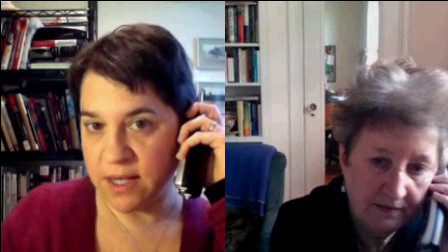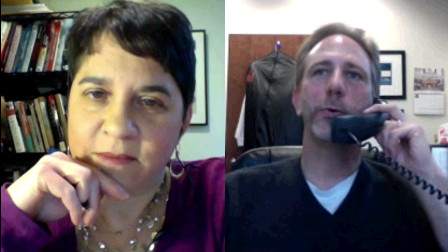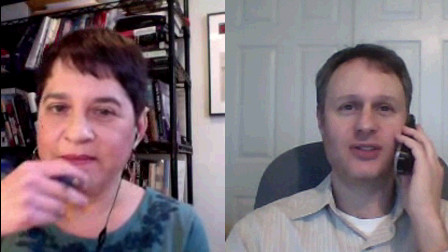Programs
Archived Programs
- 10th Anniversary
- 5th Anniversary
- Adamize
- Communitas
- Critic Proof
- Culturally Determined
- Democracy in America
- The DMZ
- Drezburt
- Feminine Chaos
- Fireside Chats
- Foreign Entanglements
- Free Will
- Friedersdorf
- The Glenn Show
- Global Dispatches
- The Good Fight round 1
- The Good Fight round 2
- Interrobang‽
- Lessons Learned
- The Mind Report
- Percontations
- The Posner Show
- Pros & Conn
- Psychopolitica
- Rational Actors
- Science Faction
- Science Saturday
- The Score
- UN Plaza
- Values Added
- Washington Monthly
- Washington Squares
- The Week in Blog
- Woodruff & Strauss
- Worldwise
The Posner Show
Sarah Posner invites guests from across the ideological spectrum to discuss breaking news and three-alarm issues at the intersection of politics and religion.

On The Posner Show, Sarah and Wil discuss the hit History Channel miniseries The Bible. Wil thinks the producers have done a good job with some elements, but critiques the series’ erasure of women. She focuses in particular on Hagar, a figure of special significance in both Islamic and African-American Christian tradition, as well as the Battle of Jericho. Why are all the characters—with the exception of angels and Satan—portrayed by white actors, until we meet Samson? Wil has strong criticisms of the way Samson is portrayed as a “mandingo” figure. Does the series help solve, as its producers contend, the problem of biblical illiteracy? Plus: Rape and polygamy in the King David story.

On The Posner Show, Sarah and Mary discuss newly elected Pope Francis. Mary argues that even though Francis is the first Jesuit pope, he will continue on the path set by John Paul II and Benedict XVI. Mary, who has lived in Argentina, expresses concerns about the Catholic Church’s involvement with the dictatorship during the country’s notorious Dirty War. She also notes that Francis has protested the current government’s liberal policies, particularly on gay marriage and abortion. She compares the Church’s role in the Dirty War to the sex abuse scandal in the US. Sarah suggests that media coverage of Francis has overemphasized his compassion for the poor. Plus: Will there be any change from Benedict’s efforts to make a “leaner, meaner church“?

On The Posner Show, Sarah talks with Debra about the legacy of former Surgeon General Dr. C. Everett Koop, who died this week. Koop was an ardent foe of abortion, but Debra recounts his adherence to science, not ideology, in concluding there was no medical evidence that abortion harms women. Has today’s anti-abortion movement differed from Koop by not separating moral beliefs from medical facts? On the AIDS crisis, Debra credits Koop with “changing the dialogue”, and promoting AIDS education in schools, in the 1980s. Has school-based sex education become passé? Plus: Debra and Koop on the set of the Golden Girls.

On The Posner Show, Sarah talks to Paul about Tim Tebow’s cancellation of his appearance at First Baptist Church in Dallas. They discuss the controversial statements the church’s pastor, Robert Jeffress, has made about Mormons, Catholics, Jews, and gays. Did Tebow disagree with the statements, or did he just want to protect his image? Paul is happy that evangelicals are less inclined to wage culture wars, but Sarah worries about hateful thoughts left unvoiced. Plus: Paul and Sarah make predictions on how long it will take for conservative Christians to accept gay marriage.

On The Posner Show, Sarah speaks with Anthea about the shocking resignation of Pope Benedict XVI. Anthea argues that the greatest mark on Benedict’s legacy will be his reactive, rather than proactive, response to the sex abuse scandal; she argues that the next pope will have to deal decisively with sexual abuse within the Church. Anthea and Sarah discuss the reasons why Catholics are leaving the church, and Benedict’s desire for a smaller, purer church. Will the next Pope come from outside of Europe, perhaps from Latin America, Asia, Africa—or even Canada? Finally, Anthea says the next pope needs to be of the 21st century, rather than the 17th.

Sarah brings Corey on The Posner Show to talk about the controversial “boycott, divestment and sanctions” (BDS) panel recently held at Brooklyn College. Corey tells the story of the backlash against the panel, and the threat to academic freedom that it posed. Sarah and Corey debate the wisdom of the backlash, and Corey describes the BDS event itself. Would this type of event cause as much controversy at a different school? Finally, Corey argues that Brooklyn College is changing—and that this isn’t a bad thing.

On The Posner Show, Sarah talks to Gershom, who says that despite all the fireworks over whether Chuck Hagel is “pro-Israel,” Israelis really don’t care. Gershom breaks down last week’s election results, and hypothesizes about the next coalition government. Although many declared the results a victory for the center, Gershom point out that the only blocs that gained were from the left. Can Yair Lapid help push Israel back to the negotiating table with the Palestinians? Will a second-term Obama and Secretary of State John Kerry be able to change the dynamic? Gershom disputes the conventional wisdom in the US that Israeli society has moved to the right, and makes the case against despair about the peace process. Finally, what do the Hagel hearings reveal about America’s relationship with Israel?

On The Posner Show, Sarah talks with Katha on the fortieth anniversary of Roe v. Wade. Is the term “pro-choice” passé—and if so, what should supporters of abortion rights use in its stead? Does it help to talk about abortion being complicated? A majority of Americans support upholding Roe v. Wade, but has anti-abortion activism at the state level effectively banned abortion in much of the country? Plus: Why Katha is happy that Todd Akin spoke from the heart about “legitimate rape.”

On The Posner Show, Sarah talks with Christian ethicist David Gushee about the Louie Giglio inauguration controversy. Giglio’s primary issue has been activism against human trafficking, which David calls “the ultimate consensus issue.” But the religious right’s litmus test for evangelicals forces them to choose between inclusion in their evangelical community and speaking their mind. Sarah and David discuss why the right’s persecution narratives are toxic, and David describes how conservative evangelicals have been “dethroned from cultural hegemony.” Should we even be having a public prayer at the inauguration? Will the Giglio incident make it harder for Democrats to reach out to white evangelicals? Plus: David’s challenge to his fellow evangelicals.

On The Posner Show, Sarah talks with Brent about how “pro-Israel” groups have dominated the debate over the Hagel nomination. Brent argues their dominance is due, in part, to the de-democratization of American Jewish organizations. Is the term “Jewish lobby” anti-Semitic, and is the term “Israel lobby” even accurate? Brent and Sarah discuss the role of Christian Zionists. What should we make of Rand Paul’s trip to Israel? Plus: Can we talk about the Palestinians?
Archives
- January 2026(8)
- October 2025(8)
- August 2025(10)
- July 2025(13)
- June 2025(11)
- May 2025(12)
- April 2025(14)
- March 2025(12)
- February 2025(12)
- January 2025(15)
- December 2024(10)
- November 2024(11)
- October 2024(15)
- September 2024(12)
- August 2024(13)
- July 2024(12)
- June 2024(10)
- May 2024(14)
- April 2024(12)
- March 2024(14)
- February 2024(13)
- January 2024(15)
- December 2023(15)
- November 2023(17)
- October 2023(16)
- September 2023(18)
- August 2023(15)
- July 2023(14)
- June 2023(17)
- May 2023(15)
- April 2023(16)
- March 2023(19)
- February 2023(15)
- January 2023(16)
- December 2022(16)
- November 2022(16)
- October 2022(17)
- September 2022(19)
- August 2022(15)
- July 2022(17)
- June 2022(15)
- May 2022(17)
- April 2022(18)
- March 2022(15)
- February 2022(15)
- January 2022(16)
- December 2021(21)
- November 2021(19)
- October 2021(22)
- September 2021(19)
- August 2021(22)
- July 2021(24)
- June 2021(18)
- May 2021(18)
- April 2021(19)
- March 2021(19)
- February 2021(19)
- January 2021(19)
- December 2020(21)
- November 2020(19)
- October 2020(19)
- September 2020(21)
- August 2020(21)
- July 2020(20)
- June 2020(22)
- May 2020(19)
- April 2020(22)
- March 2020(18)
- February 2020(13)
- January 2020(18)
- December 2019(12)
- November 2019(14)
- October 2019(16)
- September 2019(15)
- August 2019(19)
- July 2019(14)
- June 2019(17)
- May 2019(18)
- April 2019(15)
- March 2019(18)
- February 2019(16)
- January 2019(19)
- December 2018(18)
- November 2018(15)
- October 2018(19)
- September 2018(16)
- August 2018(14)
- July 2018(15)
- June 2018(12)
- May 2018(13)
- April 2018(18)
- March 2018(16)
- February 2018(13)
- January 2018(10)
- December 2017(11)
- November 2017(14)
- October 2017(13)
- September 2017(10)
- August 2017(16)
- July 2017(17)
- June 2017(18)
- May 2017(18)
- April 2017(17)
- March 2017(19)
- February 2017(12)
- January 2017(14)
- November 2016(13)
- October 2016(11)
- September 2016(12)
- August 2016(9)
- July 2016(16)
- June 2016(17)
- May 2016(12)
- April 2016(16)
- March 2016(19)
- February 2016(12)
- January 2016(17)
- December 2015(17)
- November 2015(16)
- October 2015(17)
- September 2015(21)
- August 2015(22)
- July 2015(25)
- June 2015(26)
- May 2015(23)
- April 2015(25)
- March 2015(28)
- February 2015(28)
- January 2015(22)
- December 2014(28)
- November 2014(26)
- October 2014(30)
- September 2014(26)
- August 2014(26)
- July 2014(28)
- June 2014(27)
- May 2014(32)
- April 2014(26)
- March 2014(30)
- February 2014(28)
- January 2014(30)
- December 2013(28)
- November 2013(26)
- October 2013(26)
- September 2013(26)
- August 2013(25)
- July 2013(30)
- June 2013(37)
- May 2013(28)
- April 2013(30)
- March 2013(30)
- February 2013(31)
- January 2013(33)
- December 2012(34)
- November 2012(35)
- October 2012(42)
- September 2012(35)
- August 2012(38)
- July 2012(30)
- June 2012(32)
- May 2012(33)
- April 2012(33)
- March 2012(43)
- February 2012(34)
- January 2012(28)
- December 2011(30)
- November 2011(33)
- October 2011(36)
- September 2011(37)
- August 2011(34)
- July 2011(36)
- June 2011(36)
- May 2011(33)
- April 2011(36)
- March 2011(36)
- February 2011(34)
- January 2011(35)
- December 2010(38)
- November 2010(43)
- October 2010(38)
- September 2010(36)
- August 2010(38)
- July 2010(38)
- June 2010(38)
- May 2010(38)
- April 2010(35)
- March 2010(41)
- February 2010(35)
- January 2010(40)
- December 2009(35)
- November 2009(35)
- October 2009(41)
- September 2009(39)
- August 2009(41)
- July 2009(43)
- June 2009(41)
- May 2009(39)
- April 2009(40)
- March 2009(38)
- February 2009(35)
- January 2009(42)
- December 2008(36)
- November 2008(38)
- October 2008(45)
- September 2008(48)
- August 2008(45)
- July 2008(49)
- June 2008(48)
- May 2008(49)
- April 2008(45)
- March 2008(39)
- February 2008(38)
- January 2008(40)
- December 2007(33)
- November 2007(27)
- October 2007(31)
- September 2007(26)
- August 2007(32)
- July 2007(27)
- June 2007(30)
- May 2007(30)
- April 2007(25)
- March 2007(23)
- February 2007(19)
- January 2007(18)
- December 2006(11)
- November 2006(14)
- October 2006(11)
- September 2006(10)
- August 2006(9)
- July 2006(8)
- June 2006(11)
- May 2006(12)
- April 2006(10)
- March 2006(9)
- January 2006(9)
- December 2005(10)
- November 2005(14)


